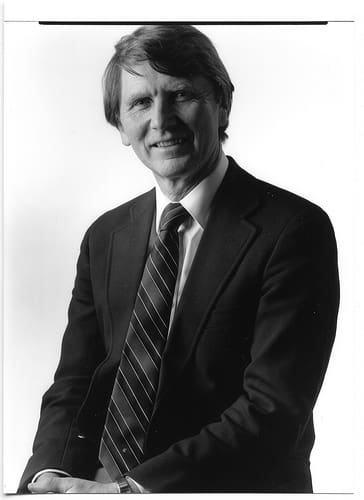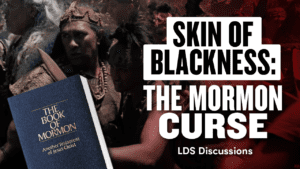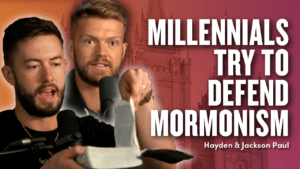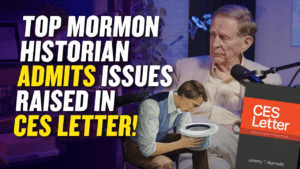 Eugene England (1933–2001) (his website can be found here) was one of the founders and great leaders in Mormon Studies and independent Mormon discussions. He and four others founded Dialogue: A Journal of Mormon Thought, for which he served as its first editor. He was instrumental in the creation of the Association for Mormon Letters, and he is considered the champion of the “personal essay” as a powerful form for Mormon expression. England was a peace activist, whose reflections on having been present in the Vatican during the 1981 assassination attempt on Pope John Paul II (one of the bullets nicked his hand and left a small burn on his temple as it whizzed past) led him to found “Food for Poland,” a large-scale effort involving students from many college campuses to provide support for the Solidarity movement when it struggling under Polish government crack downs. He was an innovative and highly influential teacher. He revamped “study abroad” programs at both BYU and Utah Valley State College, leading to unparalleled learning experiences for students who traveled with his groups to London. He supported and was an active voice for academic freedom at BYU, championed the rise of Mormon Studies at UVSC, and was an articulate voice and active supporter for nearly every good cause in independent Mormon circles for nearly four decades.
Eugene England (1933–2001) (his website can be found here) was one of the founders and great leaders in Mormon Studies and independent Mormon discussions. He and four others founded Dialogue: A Journal of Mormon Thought, for which he served as its first editor. He was instrumental in the creation of the Association for Mormon Letters, and he is considered the champion of the “personal essay” as a powerful form for Mormon expression. England was a peace activist, whose reflections on having been present in the Vatican during the 1981 assassination attempt on Pope John Paul II (one of the bullets nicked his hand and left a small burn on his temple as it whizzed past) led him to found “Food for Poland,” a large-scale effort involving students from many college campuses to provide support for the Solidarity movement when it struggling under Polish government crack downs. He was an innovative and highly influential teacher. He revamped “study abroad” programs at both BYU and Utah Valley State College, leading to unparalleled learning experiences for students who traveled with his groups to London. He supported and was an active voice for academic freedom at BYU, championed the rise of Mormon Studies at UVSC, and was an articulate voice and active supporter for nearly every good cause in independent Mormon circles for nearly four decades.
More than any of these or many other accomplishments we didn’t name, however, Eugene England was a person of faith and incredible spiritual depth who, along with Leonard Arrington and Lowell Bennion, stands as an example of a committed, faithful life of intellectual and spiritual integrity, maturity, and grace even as he was often misunderstood and under-appreciated. He is important to get to know, and that is the process that this podcast hopes to help start.
Led by guest host Dan Wotherspoon, this four-segment podcast features interviews with Gene’s daughter Jody England Hansen, granddaughter Charlotte Hansen Terry, Dialogue co-founder Frances Lee Menlove, longtime friend and fellow writer Levi Peterson, friend and student assistant (and now Sunstone editor) Stephen Carter, and UVSC colleague Brian Birch.




28 Responses
John and Don,
Thanks so much for putting this together. I look forward to listening. I was first exposed to Gene’s thought while I was on my mission (1983-1985) when my brother sent me an early transcript of his essay “Why the Church is as True as the Gospel” which he had given at a Sunstone symposium, before the insitutional church began discouraging members from participating there. (parenthetical note, the essay was immensely popular with a number of fellow missionaries, to my mission president’s consternation). I was immediately hooked and always went out of my way to read his essays wherever I could find them. I still have my well-worn copy of “Dialogues with Myself” which is one of the finest collections of Mormon-related essays I’ve ever come across. I was fortunate enough to take a class from Gene at BYU and was able to participate in several small discussion groups with him, both at BYU and at his home in Provo. I’m sure this will be conveyed in the podcasts, but what I hope people understand about Gene is that in addition to being brilliant, humble, extraordinarily faithful, and incredibly helpful to many who were trying to reconcile thought and faith, he was simply a fundamentally decent man who embodied in every sense what it means to be a Christian. To my knowledge Gene did not say much publicly about his departure from BYU, and I wasn’t close enough to him to ask him about it, but I have always believed the way that BYU treated him was shameful, and should serve as a source of embarrassment to both BYU and the LDS Church.
As long as I’m writing, a quick thanks to John and Don for consistently producting such worthwhile and fascinating interviews.
Thanks, Matt!!!!
Hey John, nice to hear from you. Keep up the great work. And my apologies to Dan for calling him “Don” twice above (the “o” in “Wotherspoon” throws me off :))
I had the pleasure of taking a class from Eugene England on two occasions at BYU. One of my favorite recollections of Eugene England’s legacy illustrates his depth and wisdom. In 1993 (+ or -), a debate arose within the English department between England and Richard Cracroft over Cracroft’s attempt to define a standard for determining whether a specific literary work qualifies as “Mormon literature.” England disagreed with Cracroft on the basis that striving to define Mormon literature in advance of reading a specific literary work would ultimately become too exclusionary and restrictive. We would lose the opportunity to be surprised by a literary work that fails to meet our predefined standard of “Mormonness” yet resonates with us nonetheless as uniquely Mormon. While Cracroft proposed to wall off the garden, England had the wisdom to see that the vines would grow over the garden wall. England was right. England’s perspective extended to people as well as literature. His warmth and love seemed to embrace and love people in a way that drew them in and never shut them out.
Most importantly to me, this old debate within the English department evidences a theme in England’s thinking that has become more compelling to me over the years. England was open, inclusive, and ready to be surprised. He was intellectually and emotionally available to unorthodox forms of truth that show us that the systems of thought and the systems of doctrine we build can become a machinery that is too unnatural, too remote, too impersonal, and abstract. England was right. He shows us that we have constructed our towers too narrowly upward to a pinhole in the sky; that we cannot climb as it were to heaven by the machines of our own intellect, by the doctrines of this or that.
England’s openness is actually a humility before the amazement of life, the vastness of truth. England’s vision shows us that theological pride is actually a closedness before the immensity of life; that our prideful orthodoxy and certainty often constrain the circumference of our understanding by gradual degrees until our spiritual vision has become a narrowly precast pinhole. So far down the rabbit hole, the sun and sky are barely visible.
Thank you Eugene England. I truly enjoyed you as a professor, but I never knew what nourishment you would provide until long after I graduated and looked back upon your influence and realized that I was too young, too orthodox, too inexperienced to appreciate your vision. Now I do. Thank you.
Jonah Swan
Jonah and Mathew73, your notes here are the exact type of reflections we’d also love to have you add over on the Eugene England Foundation website (www.eugeneengland.org). In the community section of the site, there’s a place to add reflections. I hope you will share there, as well!
Dan
Thank you Dan for the opportunity to post on Eugene England’s Foundation. I feel honored to have posted there.
Eugene England is my intellectual hero, bar none. He has profoundly influenced my thought about the gospel and the Church and the nature of involvement and participation in that Church. Reading his essays has reaffirmed my faith at critical times. I love that man.
Just finished part II. This is a great treat to “get to know” a man whom I will never meet in this life but whose work has and will continue to touch me. I’ve been thinking about the discussion of the essay “On Fidelity, Polygamy, and Celestial Marriage”. Dr. England’s daughter and grand-daughter both seemed to think that the notion of celestial polygamy is fully cultural in the church. The essay itself challenges celestial polyandry on the basis that the modern church will “sometimes (seal) a woman to more than one man”. Clearly though, this is the exception, and the current church practice is very clear – men who are widowers can be subsequently sealed to a second (or third) woman, but the opposite is not true. Celestial polygamy is enshrined in the existing temple practices, though neither the essay nor the discussion acknowledged this. How did Dr. England address this, if at all?
Beautiful….thank you. In what specific essays can I read more about Eugene Englands’ spiritual ideas about contraries. I was sitting on the edge of my seat the entire time Stephen discussed it. But it was a tease;) I need more;) This was a great podcast about a man that I have always wanted to know more about it. Thanks so much.
This was an amazing series. Thank you! Dan, you’re such a good interviewer. I love your questions and your comments, but I do have a little suggestion: Try not to laugh loudly so much! I know it’s a nervous thing, but in the first episode where your interviewee broke down telling the story of her dad’s death, you started laughing out loud! It was awkward, but you saved it pretty well. Maybe something to look for…
This podcast broke my heart. What do you get when you take the LDS General Authorities at their word when they claim to believe that all truth can be circumscribed into one great whole, that there is a place for every truth in Mormonism? What do you get when you look for a view of the gospel that is not narrow, cruel, and dogmatic? They treat you like shit.
They don’t care what you believe. They don’t care how loyal you are. They don’t care what you contribute to the community. They aren’t interested in a picture of Christ that they did not draw. “Go to hell, Gene England! By the way, we still love you and will take you back if you apologize and shut up.” This just breaks my heart.
I should probably have avoided writing the comment above, or at least had the decency to put it somewhere else. Now that I have some distance from the podcast, I have to return and say that I think Brother England was a true moral hero. I cannot say for myself that I would have the stomach to endure fools as patiently as he did. But I aspire to be able to. I think maintaining honest dialogue with others is important, especially in matters of faith and community. We cannot remain utterly silent (though we need not all be as vocal as Brother England, who really went into the lions’ den), and we should not simply shout down the idiots (who are people, just as we are, as human and as dear to God and the community, however we construe that).
Brother England stands for real moral progress, for the kind of grit that builds real personal integrity (the ability to be oneself and let others do the same without killing the community). For that I honor him (and regret being born too late to know him personally). Thanks for sharing his story with us. Don’t let my griping above deter from his message, which is one of openness and acceptance, even to those who occasionally make us feel like shit.
Appreciate BOTH posts, Hermes!
@ Ashley. Check out eugeneengland.org … A pretty comprehensive selection of England’s essays. Select “Archive” at the top of the page and then select “essays.” I recommend “the possibility of Dialogue: a personal essay”… “Letter to a college student”…”Obedience, Integrity and Paradox of Selfhood”… and “the Weeping God of Mormonism.” They all deal with “contraries” and they’re all fantastic. Another must read is “Why the Church is as True as the Gospel” but I don’t see it on the site. Google it! :)
Hi Jason,
Those are all excellent recommendations for EE’s reflections on “proving contraries.” The essay, “Why the Church is as True as the Gospel” is also available through the site. In archives under Essays, scroll down to 1999. Also it is in the Selected Writings/Personal Essays section, which you can click on off the main webpage.
New version of EE website will be up in early October. Hopefully much will be easier to find….
Cheers!
Dan Wotherspoon
Thanks Jason! I was wanting some specific essay names and you delivered. Thanks so much!
I just finished the first two series of the podcast. I do not know a whole lot about Eugene England, but have enjoyed learning about him from the perspective that has been shared. I look forward to listening to the rest of the podcasts. He sounds like a remarkable person. I just love the thought of when we find ourself in a situation of difficulty with another individual we need to look at ourself and ask, “Is it I”. That will be a blessing in my own life as I apply that.
With that being said though it seems like he maybe took it a little to extreme with the Elder McConkie situation. His essay is well thought out and I don’t believe he was presenting it as official doctrine of the church. Elder McConkie bullied him with his own theology of God already reached his absolute perfection. And the bottom line for Elder McConkie was his title made him correct. I think there are well thought out positions on both sides, but for me personally I side with England (I guess that makes me a heretic). I just wish someone would have publicly stood up to Elder McConkie more. You hear of lots of stories of people – even members of the twelve disagreeing with him, but I guess there is an image to keep. England does seem to have deep respect for the leadership – I appreciate that, but makes me wonder are we under covenant to side with our leaders when they are not acting in love?
It does make me wonder how history (or members of the church) will ultimately judge this instance (and these two people). Elder McConkie certainly has his followers, but they do appear to me to be an older generation. Even he seems to have lost a little respect within the church. People like Eugene England as a younger and more non authoratative generation of Mormons are raised may ultimatley be looked on as a model of faithfulness. It sounds like he was very faithful to the church.
Hi Chris,
Glad you have enjoyed learning more about Eugene England! Your point about wishing more people would have stood up to Elder McConkie reminds me of one of England’s essays when he expresses his own regret that he didn’t stand up more, that he too readily agreed to drop the subject they had their disagreement over. Using a line from Elder Packer, England states that he should have remembered that the call is to follow “the Brethren” and not be quite so cowed when it comes to following a “Brother.” Anyway, here’s a link to that essay, “On Spectral Evidence.” https://www.eugeneengland.org/
Cheers!
Dan Wotherspoon
How can anyone stand up to the title in power and position when the covenantal threat is the throat being cut ear to ear or the gut sliced side to side? How can people keep trying to make Love out of Fear?
Hmmm. Not sure very many Mormons think or worry about those old penalties, nor does standing up to leaders in power relate to an offense that those penalties were ever linked to. Me thinks you might just be trying to stir up trouble here. Can you show that you aren’t?
I have not listened to the podcast but was responding to the notion of follow the brethren in general. I believe that Love is the connective force of the universe and all these wranglings are about “priesthood” or the supposed right of way. Unconditional Love is the power. Priesthood is just a way people give themself permission to Love. One may only use the powers of heaven if they have unconditional love. These comments to this podcast describe a man that has Love and tries diligently to defend priesthood and church through love. All the miracles that have occurred via the priesthood have been expressed through the expression of Love. Faith healings outside of the church happen through unconditional Love. My point I hoped to get across was that Fear and Love are opposites and different things. Why defend Fear? Love is truth. Since you mentioned that the death oaths are no longer practiced that fact alone underlines organizational issues that do not represent Love yesterday today or tomorrow. We are all Love. It’s intriguing that all the secrecy, all the ritual to get where we already are and have eternally been.
I shall listen to the cast and feel for the Love being expressed whether it is misplaced in defense of organization or intellectual notion or not. Thanks.
I have not listened to the podcast but was responding to the notion of follow the brethren in general. I believe that Love is the connective force of the universe and all these wranglings are about “priesthood” or the supposed right of way. Unconditional Love is the power. Priesthood is just a way people give themself permission to Love. One may only use the powers of heaven if they have unconditional love. These comments to this podcast describe a man that has Love and tries diligently to defend priesthood and church through love. All the miracles that have occurred via the priesthood have been expressed through the expression of Love. Faith healings outside of the church happen through unconditional Love. My point I hoped to get across was that Fear and Love are opposites and different things. Why defend Fear? Love is truth. Since you mentioned that the death oaths are no longer practiced that fact alone underlines organizational issues that do not represent Love yesterday today or tomorrow. We are all Love. It’s intriguing that all the secrecy, all the ritual to get where we already are and have eternally been.
I shall listen to the cast and feel for the Love being expressed whether it is misplaced in defense of organization or intellectual notion or not. Thanks.
This is a great discussion. I feel connected to this person I’ve never met or even heard of. I want more….soooooo…….where are the essay links?
Hi! So glad you enjoyed. I don’t have access to add this to the blog post itself, but here is a link to the Eugene England Foundation website. https://www.eugeneengland.org/
The site gives access to nearly every essay he wrote, plus many other things including tributes given at his funeral and in various LDS journals and magazines. And there is more, More, MORE to come on the site. We’re going to be launching a revamped version very soon.Cheers!Dan Wotherspoon
I posted a link to the main page.
I think many Mormons can relate to the surprising realization that the commandments are actually there for our protection, and not to control us (referring to story about drunk driving accident). Perhaps it wouldn’t be such a surprise if obedience weren’t held up as the first law of heaven, as it often is in the church. Sometimes I think the emphasis on obedience actually prevents the development of wisdom, which is the ability to think critically and act appropriately in difficult/complex circumstances, even when there is nobody telling us what to do. Wouldn’t it be better, when raising children, to never label the principles of healthy living as “commandments”? Perhaps this is why even the healthier aspects of Mormonism are sometimes discarded by disaffected members, who no longer have obedience as their guide.